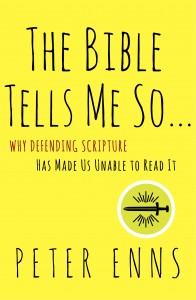Last week, we welcomed back the Questions That Haunt Christianity series with a great exchange on Tuesday and Friday. This week, we dive into to an equally vexing question about the Bible from Chris:
This question has been bugging me for a while. To preface, I consider myself a progressive (certainly ex-evangelical) Christian. My question relates to ethics in general and the Bible in particular. We all assume that there is a particular way that each of us SHOULD or SHOULD NOT act. I.e., we all harbor the notion that some acts are inherently moral or immoral. As a progressive, I don’t consider the Bible itself to be the “Word of God” or some kind of objective moral authority. I consider (as I’m sure many of your readers do) it to be a collection of writings that detail the experiences of the authors with the divine. As such, it is just as captive to subjectivity as the rest of us are.
If this is the case, however, how is it that we are to determine moral decisions? If there is no objective moral authority we can point to in order to determine an ethical system, what are we left with? (These are honest questions I have been wrestling with, as I continue to struggle between determining the possibility of access to SOME kind of objectivity, if that even exists).
You respond in the comments. I’ll respond on Friday. See all of the past questions and answers here.












